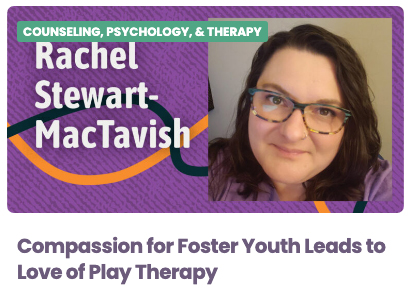Certificate in Play Therapy
Neurobiologically-informed treatment for children and families.
The need for play therapists in therapeutic and educational settings is on the rise thanks to its substantial benefits. More specifically, the dynamic interpersonal relationships that are built allow persons of any age to fully express themselves. Through self-exploration, imagination, and hypothetical circumstances, clients reveal deep psychological behaviors and feelings. Self-expression through this technique will help you build substantial accord with your clients and open the door to profound realizations.
This program is NOT designed to lead to state licensure.
Program Overview
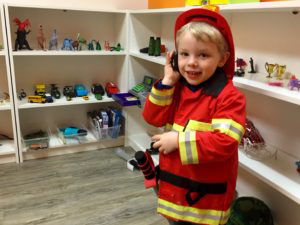
Play therapy has been demonstrated to be one of the most effective therapies for children and families needing support and skills to process their life events in a safe, structured, and healthy environment. Antioch University recognizes the increasing demand for play therapists in therapeutic and educational settings. Whether you are a current Antioch student or a working professional, we have a path that will work for you. Our program will provide you with the experience and skills you need for a successful career in this growing field. Association for Play Therapy (APT) accredited.
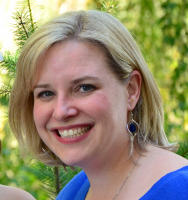
Cary McAdams Hamilton
Play Therapy, School of Applied Psychology, Counseling and Family Therapy
Connect with Us
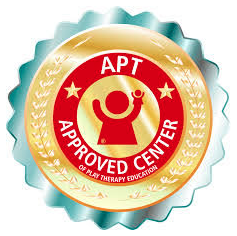
Additional Information
Approximately one year/12 credits (note: 1 credit hour at a university is equal to 1.5 credit hours in outside play therapy events) 3 weekends per quarter *Post-graduate practicum supervisor is also available upon completion of the certificate **Registered Play Therapist supervised hours must be completed after you receive your MA Explore courses, sequences, and more details at catalog.antioch.edu
Spring 2025 - Intro to Play Therapy
- April 12-13
- May 17-18
- June 7-8
Summer 2025 - Advanced Play Therapy
- July 19-20
- August 16-17
- September 13-14
Fall 2025 - Sandtray Play Therapy
- October 18-19
- November 15-16
- December 13-14
Winter 2025 - Filial/CPRT Therapy
- January 10-11
- February 7-8
- March 14-15
"Cary brought in a lot of real-life examples and showed us so many tools and toys that we can use. I felt prepared to set my own practice." -Cohort 8 Student
"The program was amazing! It provided language to translate to guardians what children need and want from others (adults) on their journey toward growth. Relevant and up-to-date neuroscience on ways to support children, teens, and adults." -Cohort 3 Student
"The best part of the program is that because Cary is such an expert and an excellent teacher, I learned more than most other play therapy programs out there. I didn't realize this until after the program and being in the field, but this program goes into so much more depth in play therapy, sand tray therapy, and CPRT than other programs. I'm better able to articulate what play therapy is, how it helps, the interpersonal neurobiology of it, and how it specifically supports neurodivergent kids in ways many other play therapists don't seem to get in their training. This increased my confidence in the services I provide, the parents' confidence in me, and my ability to meet each child where they are at, all of which makes therapy more effective." -Cohort 5 Student
“AUS’s Play Therapy program led by Cary Hamilton is a true gem for the mental health community in WA State. The focus on cutting-edge neuroscience and empirically supported research speak to the level of competence of Cary and her play therapy cohort. As a student therapist, my acquired understanding of sand tray therapy from this experience will inform my evolving style of practice for years to come. Moreover, I was psyched to learn that Siegel’s work was featured.” -Student (Zach)
“This long overdue program is especially beneficial to those working with children who fall through the cracks of conventional verbal therapies. I applaud Cary for her vision and leadership to pioneer it here. Cary brings into the classes her wealth of experience, which injects life into textbook theories. The class on the neurobiology of play is particularly helpful because it empirically explains the importance of play in the context of healing and growth. Additionally, the classes on sandtray therapy demonstrate the power of play for both adults as well as children. I highly recommend this program.” -Cohort I Student (Kim)
“The Play Therapy classes taught at Antioch have been a valuable addition to the education I have received in other CFT/Drama Therapy classes. I now have a much better understanding from a neurobiological standpoint as to why creative art therapies are effective in healing trauma, and I am excited about integrating play therapy into the work that I will be doing with adults as well as children.” -Cohort I Student (Christine)
“The Play Therapy program has been a highlight in my studies of Couples and Family Therapy and Art Therapy at Antioch! I’ve gained practical skills, knowledge, and confidence that support me in my internship, with my clients, and in thinking about my plans for the future.” –Cohort I Student (Bobbie)
“AUS’s Play Therapy program led by Cary Hamilton is a true gem for the mental health community in WA State. The focus on cutting-edge neuroscience and empirically supported research speak to the level of competence of Cary and her play therapy cohort. As a student therapist, my acquired understanding of sand tray therapy from this experience will inform my evolving style of practice for years to come. Moreover, I was psyched to learn that Siegel’s work was featured.” -Current Student (Zach)
Frequently asked questions about Antioch University Seattle’s Play Therapy Certificate Program
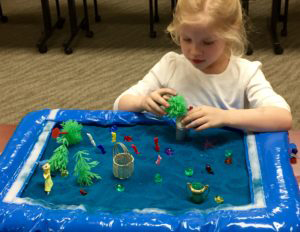
Antioch University Seattle’s play therapy certificate program has been developed to meet the academic requirements to achieve a Registered Play Therapist™️ designation through the Association for Play Therapy upon completing your respective WA state License of LMFT, SBRPT, or LMHC. This is a unique program to encourage the growth of Play Therapists in our region and community. Play therapy has been demonstrated to be one of the most effective therapies for children and families needing support and skills to process their life events in a safe, structured, and healthy environment.
- The program is 3 credits a quarter (a total of 12 credits over 4 terms).
- Length of Program: approximately one year
- Seminar Schedule: 3 weekends per quarter on weeks 2, 6, & 10
- Classes are held on Saturdays and Sundays due to the fact that many students are gaining their internship (or associate-post grad) hours.
- Curriculum
- Spring: Introduction to Play Therapy
- Summer: Advanced Play Therapy
- Fall: Seminar in Play Therapy: Sandtray Play Therapy
- Winter: Seminar in Play Therapy: Filial/CPRT Therapy
Current students have told me that the course load is reasonable and standard for a 3-credit course in terms of reading and writing. The classes are highly experiential and require client (or other willing participants) taped sessions (with informed consent, of course) in some of the classes to demonstrate active learning and application of the techniques. Therefore, completing this certificate program while doing an internship is ideal! I think it is a doable amount of work while completing your internship.
Students from the program:
“I used one of the certification classes toward my Family Practice Series Elective (CFT) and another for my General Elective—the other two were paid out-of-pocket. I was sure to plan my classes (for registration purposes) to accommodate for the weekend Play Therapy courses. This strategy assisted in preventing overwhelming responsibilities (e.g., assignments from writing-intense classes) from impacting essential reading and study time for Play Therapy.” “Since starting the certificate program, I have been enrolled in two other classes—including internship. This arrangement truly depends on your flexibility and commitments. The most time-consuming assignment is the final paper, which requires me at least a full weekend to complete–not including the preparation (i.e., video recording, paperwork).”
"Ideally and depending on people’s learning styles, two classes during graduate school should be enough to manage. If post graduate studies, being able to be fully immersed only in the play therapy program is fits well in your schedule."
"It was manageable to do with case consult+ one per quarter play therpay course. If you are doing it your internship, you can gather your play therapy hours."
"For students that don't have a lot of weekend activities/responsibilities, it could easily be added like an extra course in addition to the normal course load the student takes. If a student is a parent or otherwise has a lot of weekend commitments, know it will be more of tough squeeze. In that case I'd suggest if you typically take 3 classes per quarter, take 2 courses in addition to the play therapy program."
Yes, you may take only the Introduction to Play Therapy course. As this program is sequential, classes must be taken in a specific order (if you are in the cohort track). However, preference will be given to cohort members (not guaranteed admission).
[response from current student] “I noticed the material becoming more salient weeks following the first Introduction to Play Therapy class. Some of the concepts (e.g., lifecycle development, attunement, counseling children) are consistent with required CFT courses, however, are exhaustively covered in Cary’s instruction. Overall, the Play Therapy certificate program has benefited my practice in internship, and paved the path I now look forward to pursuing following graduation.”
There are many benefits of the play therapy program! First and foremost, play therapy meets children where they are at developmentally and therefore is beneficial for children, adolescents, and families with a myriad of diagnostic challenges and presentations. It is very comprehensive, and this modality is becoming a prominent therapy throughout the nation. However, if students are not interested in working with this population, the program may not fit their needs.
From students:
"As a therapist who has been in the field for 4 years, being trained in play therapy and getting the RPT™️ has been HUGE in building and maintaining a caseload despite the economic recession. The need for play therapists is particularly massive in this area, and I'm constantly having to turn interested clients/parents away."
"I feel much more confident in my work with children and teen. I even use my play therapy and expressive art training with adults. My understanding of neurodiversity and creating a safe space for all kind of neuroexpression is much better."
Visit the following link to learn more about the requirements to become a Registered Play Therapist (RPT)™️ via The Accrediting Body of The Association for Play Therapy.
In WA state, students can only get supervision upon graduation, when they are gaining their associate hours toward licensure. RPT™️-specific supervision is provided through RPT-S™️ like myself, Cary Hamilton, and is independent of the play therapy concentration track at Antioch. At least 15 hours must be completed with a different RPT-S™️.
No! Only once you have been certified by the National Association for Play Therapy (a4pt.org) and you gain your RPT™️ Provider # can you be called a “play therapist.” After taking this APT-approved certificate program, you will have almost all your Continuing Education requirements to be designated as an RPT™️. Once you have gained all your contact hours (e.g., LMHC hours and RPT hours concurrently), and are applying for licensure, you can also apply to become a registered play therapist (therefore, you will have this designation along with your licensed mental health counselor or MFT license). Finally, as this program is APT-Approved and conducted in a University setting, students (graduate or post-graduate) can earn their CE hours faster through graduate credit than attending conferences/workshops to gain this play therapy-specific education.
This program is open to all graduate students and post-graduates! For those of you who are interested in the concentration but may be working full-time, we have done our best to accommodate everyone by allocating classes to full day weekend schedules (weeks 2, 6, 10). Additionally, the experiential component integrates well into clinical settings
Admissions / Cost / Aid
Admission
Requirements
- Must be enrolled in or have completed an MA program that leads to licensure in the mental health field
- Applicant must provide an MA transcript
- If already licensed, applicant must provide a copy of their license
- A statement of purpose is also required that answers the following: How do you envision play therapy integrating with your current or future professional practice?
How to apply
New applicants Complete the online admissions application.
- A Master’s degree from a regionally accredited institution is required. Submit an official copy of your Master’s degree transcript or current program showing enrollment in the MA program leading to Licensure in the field. Transcript evaluations are required for all coursework completed outside of the U.S. or Canada (except Quebec). See the Transcript Evaluation section on the International Students webpage for details.
- If already licensed, submit a copy of your license.
- Admissions essay. Submit a typewritten, double-spaced, one to two-page (between 250 and 500 words) response to the following question: How do you envision play therapy integrating with your current or future professional practice?
- All supporting materials, transcripts, essays, etcetera, should be emailed to [email protected] or mailed by the below deadline to the Admissions Office Antioch University Seattle 2400 3rd Avenue, Suite 200 Seattle, WA 98121
Currently enrolled Antioch University students
- Complete the Play Therapy Application Form for current students and submit to the Integrated Student Services office.
Application Deadlines
| Quarter | Application Deadline* |
|---|---|
| Spring | March 15 |
| * Complete admission files (all required documents) received after the deadline date may be considered if space is still available in that quarter. | |
| Please review the Academic Calendar for additional details. | |
Cost
- For students currently enrolled in a graduate program at AUS, the cost is equal to graduate tuition.
- For students enrolled in the certificate track only, total tuition is $4,368 for the program (12 credits at $364/cr), plus course fees up to $40 per class. Quarterly fees: $70 Student Services Fee, $30 Technology Fee.
- Antioch Alumni from a Masters-level or higher Counseling Psychology Program receive a discount of $50 per credit, for a total tuition of $3,768 for the certificate program (12 credits at $314/cr), plus course fees up to $40 per class. Quarterly Student Services and Technology fees are waived.

Start your Antioch Journey
Take your next step - talk to our admissions team to find the right program for you.

